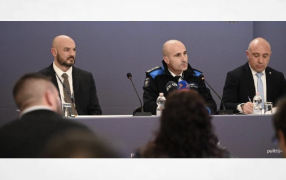LAWYERS
“We were heartened to see that the US Attorney for the District of Colorado will continue to be guided by the common sense law enforcement priorities set forth in the Cole memo. We hope that Congress will take this opportunity to promote economic growth and job creation by providing greater legal certainty so that the United States can remain competitive with countries like Canada and Israel that are making a concerted effort to promote research and innovation in the cannabis industry.”
Adam Foster, Esq.
Partner Hoban Law Group
730 17th Street, Suite 420 Denver, CO 80202
Phone: 303-674-7000 Direct: 720-897-7475 Fax: 303-382-4685 Email: adam@hoban.law Web: hoban.law
Fellow cannabis activists and fellow cannabis attorneys:
This is what I shared today with my colleagues in NORML concerning the Sessions pronouncement:
Let’s be fair about it. I know a lot don’t want to admit it , but the fault is Congress, not Jeff Sessions. Congress knows better than to think marijuana prohibition is good public policy or a question of public health and/or morality.
Congress and all the Gingrich/Gore/Clintons/Obama/Bush types ( who all know better) are to blame. Jeff Sessions is saying ( is he not?) that the Administration is supposed to enforce the laws Congress has passed, not go along with the wink-and-nod of the royal decrees of recent years.
Please: it’s past time for congress to get the federal government out of the anti-cannabis business of the 1930s. HR 1227 would do that; it is my understanding that Congressman Pete Sessions locks it in committee.
It surprises no one that the Democrats and Republicans have brought us to this point. It’s past time they act.
Please check out the following article:
http://www.nationalreview.com/article/455147/marijuana-decriminalization-congress-must-act
Walker Chandler
Chandler and Chandler Law Group
www.chandlerandchandlerlaw.com
770 468 6538; fax: 770 818 5450
Attorney General Sessions rescinded, effective January 4, 2018, previous enforcement priorities of the DOJ related to marijuana – including the Cole Memo. The Sessions Memo dictates that federal prosecutors should follow the “Principles of Federal Prosecution” originally set forth in 1980 and subsequently refined over time in chapter 9-27.000 of the U.S. Attorney’s Manual. Sessions goes on to state in his memo that “These principles require federal prosecutors deciding which cases to prosecute to weigh all relevant considerations, including federal law enforcement priorities set by the Attorney General, the seriousness of the crime, the deterrent effect of criminal prosecution, and the cumulative impact of particular crimes on the community.” It is important to note that Sessions has not previously set any specific enforcement priorities with respect to marijuana, nor has this memo created any new enforcement priorities of the DOJ. Rather Sessions has removed the foundational guidance that states have relied on to regulate the production and distribution of marijuana pursuant to state law and the will of each states’ citizens. The Cole Memo actually set 8 enforcement priorities for the DOJ with respect to marijuana, which Sessions has now unilaterally rescinded.
So what does this mean?
It is important to note that the Cole Memo never legalized marijuana at the federal level, but in fact specifically reserved the DOJ’s authority to enforce federal law, including federal laws relating to marijuana, regardless of state law. Specifically, the Cole Memo provided that “neither the guidance herein nor any state or local law provided a legal defense to a violation of federal law…” What the Sessions Memo creates is broad discretion for federal prosecutors to potentially prosecute state-legal marijuana businesses even if they are not engaged in marijuana-related conduct enumerated by the Cole Memo as being an enforcement priority. At this time, the DOJ has given no indication that there will be any enforcement priorities targeted at state-legal marijuana businesses.
The Sessions Memo will also create uncertainty regarding banking – FinCEN has relied on the Cole Memo to formulate its policy relating to financial services to marijuana-related businesses that many banks rely on to bank the marijuana industry. As of the release of this summary, FinCEN’s guidance has remained and it is unclear if FinCEN will review its current policy to come in line with the Sessions Memo. A change in FinCEN guidance could result in state-legal marijuana businesses losing access to the banking system.
Notwithstanding the foregoing, it should be noted that Congress has already cut-off federal enforcement dollars to the DOJ aimed at prosecuting state-legal medical and industrial hemp businesses per the “Rohrabacher–Blumenauer” amendment to the fiscal budget. This was affirmed by the 9th Circuit when it concluded that §542 of the Consolidated Appropriations Act prohibits DOJ from spending money on actions that prevent medical marijuana states giving practical effect to their state laws that authorize the use, distribution, possession, or cultivation of medical marijuana. Congress is attempting to finalize this budget before January 19th, so it is unclear if the existing Rohrabacher–Blumenauer amendment protecting state-legal medical and industrial hemp businesses will stay. If the amendment prohibiting the DOJ form utilizing funds to prosecute state-legal marijuana businesses does not make the final budget, we will clearly see that Congress is not interested in protecting such businesses. However, there are 30 states that have some form of legalized marijuana laws on the books and numerous congressional leaders (including members of the GOP) have already condemned the Sessions Memo, there is a strong possibility that Congress will clear up any confusion of DOJ enforcement priorities by keeping the amendment to the final budget.
Now is not the time to for the cannabis industry to be complacent. Every participant in the industry needs to contact their congressional representative to ensure the DOJs enforcement priorities respect state’s rights. Cannabis businesses also need to ensure full compliance with state law and develop robust compliance programs. The Cannabis team at Husch Blackwell will continue to monitor this development.
|
ATTORNEY GENERAL JEFF SESSIONS LIES TO REPUBLICAN SENATORS AND RESCINDS COLE MEMORANDUM—WHAT’S NEXT? |
|
|
NOT MUCH!!!!! By now most of you have probably heard that the Cole Memorandum, the U.S. Justice Department’s official guidance issued to states with legalized and regulated marijuana programs in 2013, has been officially rescinded by United States Attorney General Jeff Sessions. While today’s announcement by the AG is irrational, contradicts statements he made during his Senate confirmation process, and is against the will of a majority of the American people, it is also not entirely unexpected. For a variety of reasons, some of which are outlined below, we encourage all of our friends, colleagues and clients to remain calm and take today’s events for what they are (foolish political posturing) and not for what they are not (the end of cannabis industry and a return to draconian prohibition policies). Since the news of Jeff Sessions’ impending announcement broke at approximately 5:30 a.m. Oregon time, the Green Light Law Group team has been analyzing the issues involved and keeping close tabs as the issue has developed. As this very hectic day comes to a close, we feel that it is important that we all take a look under the surface to see what has really occurred and how it will impact you and the rest of the us in the cannabis industry: First, it is important to note that while the Cole Memorandum has been rescinded, it has not been replaced by any specific policy directives or enforcement priorities with respect to marijuana. Indeed, today’s memo from the AG rescinds the 2013 Cole Memo, but it notably does not direct the Criminal Division of The U.S. Justice Department and DEA Headquarters to begin a new campaign to prosecute state legal marijuana businesses. Rather, today’s announcement by the Justice Department replaces the Cole Memorandum with the prosecutorial discretion of individual U.S Attorneys in states where marijuana has been legalized by the will of the people in those states (more on this below). Unless and until today’s action is followed up with any new policy directives from Mr. Sessions’ office ordering the U.S. Attorneys to actively and aggressively investigate and prosecute state-licensed marijuana businesses, there does not appear to be any change in federal enforcement or increased danger to Oregon licensees. Second, the political backlash against the AG’s actions today began almost immediately—and it is resoundingly bi-partisan. By the time the clock struck 9:00 a.m. in Portland, two Republican Senators had already expressed their shock and outrage. Cory Gardner, Colorado Senator and member of the Senate Judiciary Committee, publicly stated that he feels deceived by Mr. Sessions and intends to hold up confirmation of President Trump’s nominees for those Justice Department posts in light of today’s announcement. Senator Lisa Murkowski, Republican from Alaska, echoed Mr. Gardner’s statements indicating that she had believed that the AG would have worked more closely with the States and with Congress before taking such a disruptive action to economies of states with legal and regulated marijuana programs. By lunchtime, just about every state and local senator, representative, governor, and attorney general in our largely democratic part of the world had expectedly come out strongly in opposition to the move by the AG, including our own Representative Earl Blumenauer who called the move “outrageous.” Third, by the time most of us were heading home from work today, the U.S. Attorneys to whom the prosecutorial discretion was granted this morning all announced that the rescission of the Cole Memorandum this morning would not change anything with respect to the enforcement of marijuana crimes in each of their respective states. Our own U.S. Attorney, local Oregonian Billy Williams, issued the following statement: “We will continue working with our federal, state, local and tribal law enforcement partners to pursue shared public safety objectives, with an emphasis on stemming the overproduction of marijuana and the diversion of marijuana out of state, dismantling criminal organizations and thwarting violent crime in our communities.” If you parse through his statement, he is merely echoing the directives of the Cole Memorandum. The statements by the U.S. Attorneys of Washington, California, and Colorado were all of similar content and sentiment. So, what can we, as an industry, take away from today’s events? We think the single most important message from today’s events is nothing new to us: the importance of compliance; and to that end, the importance of having an “effective” and documented compliance program in place for your cannabis business. Fortunately, even viewed through the lens of an uncertain U.S. Justice Department, there is guidance available from the DOJ as to what constitutes an “effective” compliance program in the context of regulated and potentially criminal activity (e.g. financial crimes), and there are experts out there (including us) who can help you get those in place. At the end of the day, the best defense to federal prosecution is just as it was at the beginning of the day, maintaining compliance with your regulatory regime. And so, at the end of this day, our message to all of you tonight is to enjoy your meals, be close with your family and loved ones, and sleep soundly knowing that tomorrow the sun will rise again over a thriving cannabis industry in Oregon and beyond! |
CONSULTANCIES
5 January 2018
One Step Back, Two Steps Forward?
The announcement by AG Jeff Sessions to rescind the Obama Administration’s guidance on Marijuana business activities (Cole Memorandum) causes a certain near term concern for investment and growth potentials within the Cannabis industry. Although the Federal Government has continued to maintain the prohibitive legal status of marijuana, the pressures brought to bear by the multitude of state statutes that have locally decriminalized and regulated marijuana had heretofore gradually comforted business development within the industry. This action by the Attorney General creates a heightened level of ambiguity with respect to the federal government’s tolerance for marijuana businesses to continue operations under state laws that conflict with the federal guidelines that continue to classify marijuana as a class 1 narcotic. However, in light of the cultural, economic, and political advances in marijuana acceptance and desirability by a majority of Americans, this aggressive attempt by Mr. Sessions to move the country backward may in fact act as a catalyst to accelerate the timeline for federal changes.
A Federal Crackdown on Marijuana – Not Likely: AG Sessions indicates the responsibility of enforcing federal marijuana laws is now at the discretion of each federal prosecutor (92 total) — there has been no indication for a widespread directive to cease and desist state regulated cannabis markets and we expect law enforcement priorities to remain status quo. If federal intervention were to occur, we believe it would be isolated to non compliant businesses. We estimate that California alone will account for ~40% of the U.S. retail market and view it highly unlikely that any of its 4 U.S. Attorneys would take action that would temper the growth of its newly regulated medical and recreational use markets. Also of note is the fact that existing restrictions in the Federal Budget prohibits federal agencies from using funding to prosecute medical marijuana enterprises. The economic stimulus of a legalized cannabis industry in the U.S. is substantial and the political backlash of a shutdown is too significant. Immediately, politicians on both sides of the aisle reacted in opposition to the Sessions rescission and these headwinds may not only stymie the purpose of his initiative but might very well have the unintended consequence of accelerating the timeline for progressive changes in federal laws.
Cannabis Banking – More Uncertainty: With the clear and present risk of operating a cash only business (particularly in CA where we expect retail sales this year of~ $5.2B not including sales and excise tax collections) the bigger issue at hand centers on banking. Current FinCEN guidance requires banks to ensure its cannabis customers are in compliance with a now defunct Cole Memo. Until revised FinCEN guidance is issued, we think banking will remain problematic.
Capital Deployment – Slowdown Likely Near Term: We think the confusion caused by the Sessions’ recision will arguably lead many investors to remain cautiously observant from the sidelines. This may well have an affect upon short term growth within the industry. Accordingly, we expect to see a regression to lower valuations that may eventually create more attractive investment terms, while creating a larger funding burden on businesses. Eventually, however, we expect a return to confidence and growth.
ORGANIZATIONS / ASSOCIATIONS
Statement Regarding U.S. A.G. Jeff Sessions Rescinding Obama-Era Policies On Cannabis
ORCA and our members stand united in our firm and absolute opposition to the reprehensible decision by Attorney General Jeff Sessions to rescind the Cole Memo and other previous Obama-era cannabis policies.
His actions take America backwards, and run counter to the will of the American people, Oregon voters, empirical evidence, human decency, and President Trump’s very own words during the 2016 election.
In a time when 73% of Americans [including 51% of Republicans] support sensible cannabis laws for medical and adult use cannabis, the administration is placing themselves on the wrong side of history. The many states that have proceeded to tax and regulate adult use cannabis sales – now available to 1 in 5 Americans – strongly favor these policies, and they’re generating revenue for vital services like education, public safety, and drug education and prevention programs. Well over half the states in this country have some type allowance for cannabis for medical use – a policy that is consistently supported by huge majorities of voters.
Attorney General Sessions, President Trump, and Congress should follow the opinion of the firm majority of Americans, stop perpetuating a racist and inhumane “war on drugs”, and allow states to govern themselves. We believe that going against the clear will of the people is only going to further crystalize support for our issue, and energize the movement for national legalization – especially if we all work together.
Conversations are already occurring with state, federal, and local policymakers who are working towards possible solutions to protect our businesses. We are extremely fortunate to have strong leaders on this issue in our Congressional and Senate delegations like Rep. Blumenauer, Sen. Merkley, and others who have been some of the most vocal opponents of this regressive move; we stand in support of our federal delegation.
Folks in the Oregon cannabis industry should not panic just yet. The impact of this recent move remains largely unclear until we find our more information; it is still possible that all of this amounts to nothing much. Due to the folks working hard in our state government, DOJ, Gov. Brown’s office, and other local leaders vigorously defending our industry, the consensus seems to be that legal cannabis businesses will likely stay a very low federal enforcement priority and that folks operating entirely above-board will stay protected.
It is imperative for our industry – now more than ever – to be united, organized, and mobilized. The relentless work and sacrifices that so many have made is finally paying off, and we will not allow this decision to derail the momentum of our movement or the nascent industry we created. If you aren’t already involved, please become a member of ORCA today to support our fight for national cannabis legalization.
We will continue to do all we can for our members, and for the Oregon cannabis industry at large, to help promote sensible solutions to this issue at every level possible. With your help, we can make a difference by helping to end federal prohibition and cultivating an environment where all of our businesses can thrive.
NCBA Response to AG Sessions and the Cole Memo
For the full NCBA statement, visit our website.
Earlier today, Attorney General Jeff Sessions announced the revocation of the Cole memo. As attorneys that serve businesses in the cannabis industry, we strongly condemn this development while recognizing that this does not constitute a change in law.
The Cole Memo directed US Attorneys to use discretion to prioritize certain types of violations in prosecuting cannabis operators, but, strictly speaking, it did not make operations in cannabis legal. Under Sessions’ new guidance, US Attorneys retain broad prosecutorial discretion, and we hope that regulated activity that is legal under state law will not distract prosecutors from serious violations of federal law.
The Colorado US Attorney issued a statement that reflects how we believe US Attorneys should interpret the development:
“Today the Attorney General rescinded the Cole Memo on marijuana prosecutions, and directed that federal marijuana prosecution decisions be governed by the same principles that have long governed all of our prosecution decisions. The United States Attorney’s Office in Colorado has already been guided by these principles in marijuana prosecutions — focusing in particular on identifying and prosecuting those who create the greatest safety threats to our communities around the state. We will, consistent with the Attorney General’s latest guidance, continue to take this approach in all of our work with our law enforcement partners throughout Colorado.”
We applaud the US Attorney for Colorado in responding so quickly to this announcement and for reaffirming a commitment to prioritizing violent and other serious federal crimes.
That being said, we must prepare ourselves and our clients for a shift in priorities from the federal government. We will be hosting an emergency webinar addressing potential problems raised by the DOJ’s new guidance – please check back on our site for more information.
Pushing cannabis market participants into a lawful, regulated, and transparent industry is beneficial for consumers, producers, and society alike. We will continue to offer our support to our members and members of the legal community to achieve the important goal of a functional cannabis market through legal education and robust legal services.
MEDIA
In the wee hours of Jan. 4, the Associated Press broke the news that Attorney General Jeff Sessions would be ending the Obama administration’s protections of state-compliant cannabis businesses effective immediately.
Since rumors of Sessions’s appointment to the Attorney General post first swirled over a year ago, activists have worried he would open new fronts in the War on Drugs, particularly when it came to state-licensed marijuana providers. A common worry was that he would “turn back the clock” on progressive pot policies and return the country to the Reagan Era.
Just hours after the AP report on Thursday, Sessions made those worries official in a one-page memo. In the memo, Sessions rescinded the policies of the Department of Justice’s 2013 “Cole Memo,” which had outlined the limited scenarios in which the federal government would intervene in legal state cannabis industries — such as when cannabis was crossing state lines or being sold to minors.
“Given the Department’s well-established general principles, previous nationwide guidance specific to marijuana enforcement is unnecessary and is rescinded, effective immediately,” Sessions wrote in the memo, which he sent federal prosecutors nationwide.
However, because the Cole Memo had reinforced the Justice Department’s ability to prosecute criminals in the black market, Sessions’ new policy only serves to broaden the scope of federal prosecutors to include state-compliant companies, which potentially makes it more difficult for them to target those actors who are not state compliant.
It should be worth noting that the Rohrabacher-Blumenauer amendment remains in effect, which restricts the Department of Justice’s ability to use federal money to target state medical marijuana markets. However, the Rohrabacher-Blumenauer amendment is set to expire soon with the federal budget, which will be up for a vote again on Jan. 19.
The nation’s leading pot policy minds have been sharing their thoughts on the situation throughout the morning.
INDUSTRY LEADERS
Do you now understand the chaos? In the middle of chaos lies opportunities.
In our opinion, the cannabis industry is here to stay. It will become more compliant, banks will stay away but most did not participate under the Cole Memorandum (only 400 chose to registered with FinCEN)
Given we are not a marijuana bank and we specialize in higher risk environments, cashless at state and county fairs as well as other monetization systems far exceeds the cannabis industry. There are many reasons to participate in the cannabis industry but it is but one vertical among many opportunities.
Larry Lipman EXPO Financial Solution For USA Cannabis Sector

























